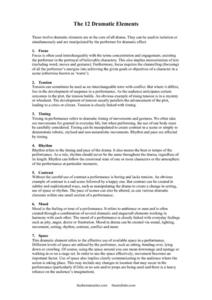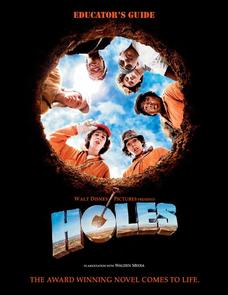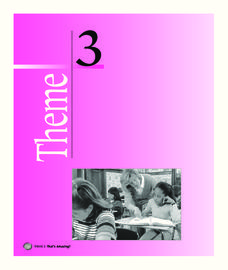National Security Agency
Equations and Expressions
Learners demonstrate their knowledge pictorially, concretely, and abstractly in this unit meant to last three hours over three days. Using hands-on activities, manipulatives, real-world applications, and problem solving, learners write...
Drama Teacher
The 12 Dramatic Elements
Plays are meant to be seen and so are these 12 elements that give plays the dramatic effect. Introduce young actors to these key terms and their explanations
Read Theory
Analogies 1 (Level 6)
Get your middle schoolers up to scratch with analogies using this worksheet. Pupils complete 10 analogies by determining the associations between the words and using the provided bridge sentences.
Edmond Public Schools
8th Grade Science Resource Book: Unit 2 - Physics
Get things moving with this extensive collection of physical science resources. Covering the fundamentals of measurement, graphing, lab safety, and experimental design as well as the specific scientific concepts of velocity,...
Novelinks
The Color of Water: Concept Analysis
Considering using James McBride's autobiography/memoir The Color of Water with your class? Check out this seven-page informational packet that includes background information on McBride, the organization pattern of the book, and issues...
NYU Student Health Center
SOS For Emotions
How can we care for our emotional health? By following the tips in this colorful, helpful, suggestion-filled guide.
Houghton Mifflin Harcourt
Surprise!: Challenge Activities (Theme 2)
Surprise! is the theme of this series of challenge activities. The surprise comes from the information your scholars will discover when researching topics such as alligators and crocodiles, living in other countries, becoming a...
National Science Teacher Association
Middle School Sampler: Science
Focus on inquiry-based learning in your science class with a series of activities designed for middle schoolers. A helpful packet samples four different texts, which include activities about predator-prey relationships, Earth's axis and...
Curated OER
Educator's Guide: Holes
You'll be a star at your next grade level meeting with an educational unit on Louis Sachar's Holes. Based on both the novel and film, the lessons include applications to language arts with character studies and movie reviews; social...
America's Blood Centers
My Blood, Your Blood
Dracula isn't the only one who needs blood to survive. The eight-part unit includes seven lessons, five demonstrations, seven labs, and a project to organize a blood drive. Class members learn about the parts of blood, the form and...
EngageNY
Margin of Error When Estimating a Population Proportion (part 1)
Use the power of mathematics to find the number of red chips in a bag — it's a little like magic! The activity asks learners to collect data to determine the percentage of red chips in a bag. They calculate the margin of error and...
Virginia Department of Education
DNA Structure, Nucleic Acids, and Proteins
What is in that double helix? Explain intricate concepts with a variety of creative activities in a lesson that incorporates multiple steps to cover DNA structure, nucleic acids, and proteins. Pupils explore the history of DNA structure,...
University of Colorado
Rings and Things
Galileo first observed Saturn's rings in 1610. Through the use of a flashlight and baby powder, classes see how they can observe the rings of the outer planets from far away. Another demonstration shows how these rings, made of ice and...
International Technology Education Association
Dampen That Drift!
The spacecraft is drifting too far off course! Two games help explain how a spacecraft can use its thrusters to maintain its position. The games have pupils be the components of vectors in order to create and counteract the disturbances.
Houghton Mifflin Harcourt
That’s Amazing!: English Language Development Lessons (Theme 3)
That's Amazing! is the theme of an English language development unit created by Houghton Mifflin. Following a speak, look, move, and listen routine, scholars delve into topics; seasons, weather, animals, landforms, telling time,...
Curriculum Corner
Inferencing
Inferencing is a necessary reading skill to uncover non-explicit messages in text. Use the set of resources as a way to guide learners toward becoming expert inferrers through reading prompts and literature with text and without text.
Other popular searches
- Mystery Genre
- Elements of Mystery
- Mystery Book Reports
- Mystery Box
- Mystery Genre 5th Grade
- Mystery Lesson Plans
- Nate the Great Mystery
- Mystery Story
- Coloring a Mystery Picture
- Mystery Plays
- Mystery Novels
- Mystery Story Starters

















